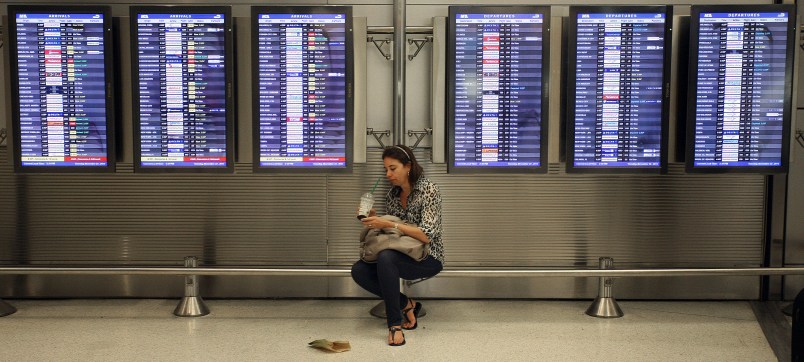WASHINGTON (AP) — The U.S. government is investigating possible collusion between major airlines to limit available seats, which keeps airfares high, according to a document obtained by The Associated Press.
The civil antitrust investigation by the Justice Department appears to focus on whether airlines illegally signaled to each other how quickly they would add new flights, routes and extra seats.
A letter received Tuesday by major U.S. carriers demands copies of all communications the airlines had with each other, Wall Street analysts and major shareholders about their plans for passenger-carrying capacity.
Justice Department spokeswoman Emily Pierce confirmed Wednesday that the department was investigating potential “unlawful coordination” among some airlines. She declined to comment further, including about whichairlines are being investigated.
Thanks to a series of mergers starting in 2008, American Airlines, Delta Air Lines, Southwest Airlines and United now control more than 80 percent of the seats in the domestic travel market. During that period, they have eliminated unprofitable flights, filled a higher percentage of seats on planes and made a very public effort to slow growth in order to command higher airfares.
It worked. The average domestic airfare rose 13 percent from 2009 to 2014, when adjusted for inflation, according to the Bureau of Transportation Statistics. And that doesn’t include the billions of dollars airlines collect from new fees: $25 each way to check a bag and $200 to change a domestic reservation. During the past 12 months, theairlines took in $3.6 billion in bag fees and another $3 billion in reservation change fees.
All of that has led to record profits for the industry. In the past two years, U.S. airlines earned a combined $19.7 billion.
This year could lead to even higher profits thanks to a massive drop in the price airlines pay for jet fuel, their single highest expense. In April, U.S. airlines paid $1.94 a gallon, down 34 percent from the year before.
__
Koenig reported from Dallas, Mayerowitz from New York.
__
David Koenig can be reached at http://twitter.com/airlinewriter, Mayerowitz at http://twitter.com/GlobeTrotScott and Tucker at http://twitter.com/etuckerAP.
Copyright 2015 The Associated Press. All rights reserved. This material may not be published, broadcast, rewritten or redistributed.







The airlines offer a great example of what happens when an industry manages to take advantage of deregulation, union smashing, and reduced competition. For that matter it is a fine example of the end result of unbridled capitalism and why we need government intervention.
If the proponents of unfettered capitalism were to be proven right, the airlines would maximize customer satisfaction by increasing the numbers of flights, and the numbers of planes, and compete to drive down costs of flights, and offer a better customer experience by enlarging seats and offering more amenities. What we see instead is a race to the bottom of lousy treatment, lower wages and benefits for airline employees, fewer standard perks, more add-on fees for what was formerly included in the price of the ticket, and overall higher prices. Great for stockholders and airline executives, but bad for customers.
If you can afford to fly first class, its a great experience, but for the cattle in the cheap seats, it sucks. But like the economy, that was the point all along. For those few at the top of the heap, life is good. For everyone else, not so much.
Just make them play on a level field. OK…you wanna bag me for 200 bucks because I change a domestic ticket…fine…but I get 200 when you change it. If I get stuck in Atlanta or Huston because you had a problem…pay up just like you want me to pay up. If you jack with leg 1 of my flight causing me to miss leg 2: Pay up. If you leave my bag in limbo: Pay up.
I’m fine with them making money. But lets do it fair.
What you have here is yet another “legacy” relic of that greasy haired B Movie actor turned President who has been canonized by the Grumpy Old Party.
He was the one who ran amok, de-regulating everything in sight. What it has led to is perfectly mirrored in the “airline” industry, whose specialty is treating cattle like cattle.
Another question and a better discussion might be had if the question focused on why the cattle put up with being treated like cattle in the first place, flying cattle or not.
I’ve been waiting for this sort of investigation, but given the current nature of the US (ha-ha-ha) Government, I doubt anything of real importance to the cattle will actually come about.
The U.S. government is investigating possible collusion between major airlines to limit available seats, which keeps airfares high, according to a document obtained by The Associated Press.
In other news, the government announced the formation of a committee to investigate whether the sun rose in the East today.
Indubitably. There used to be a few empty seats when I flew transatlantic–now every single seat is filled. Now that is NEVER the case.
The way the airlines do it is through their consortia, so say you’re scheduled to fly to Paris on one airline and their partner airline has a plane going out a few hours later. Neither is completely full. So an hour or so before your flight, you get a phone call or email saying your original flight has been canceled but they ‘managed’ to get you on a later flight–with a ‘sister’ airline.
You arrive to find not even one square inch of extra space for you or your belongings.
It’s a real scam. And what it means is that there are no discounted fares available as airlines try to fill up planes that aren’t yet carrying a full load.